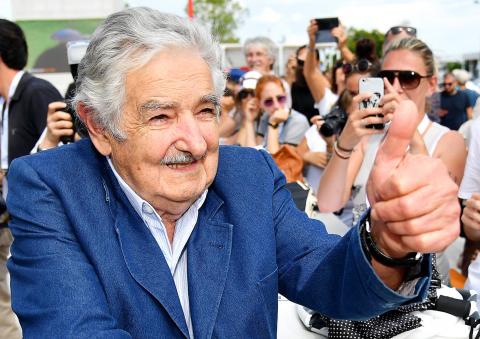He is 83 and was never exactly movie star material, but Jose “Pepe” Mujica, the former president of Uruguay, is the undisputed star of the Venice film festival.
“El Pepe” — dubbed “the world’s humblest head of state” for giving away 90 percent of his salary to good causes — is the hero of two films, attracting just as many autograph hunters and selfie seekers as some Hollywood stars.
“Pepe! Pepe! Pepe!” shouted a group of teenagers who spotted him arrive Monday.

Photo: EPA
“I am not a star,” said the rather embarrassed veteran left-winger, sporting one of two suits he owns, after the premiere of El Pepe, a Supreme Life by the cigar-chomping Serbian director Emir Kusturica.
“I am only here because my friend Kusturica asked me,” said the man who chose to stay in his tiny farmhouse outside Montevideo growing his own vegetables rather than move into Uruguay’s presidential palace when he was elected in 2010.
Five years later on the day he left office Kusturica filmed tens of thousands of people lining the streets of the capital to cheer the man they credited with cutting the country’s poverty rate from 40 to 12 percent.

Photo: EPA
“Usually people take to the streets to get rid of politicians,” said the flamboyant Sarajevo-born film-maker, who previously shot a portrait of Argentina football legend Maradona.
ROBBING BANKS
“We are not used to politicians who are an inspiration.”
Kusturica — one of the few directors ever to win the Palme d’Or twice — said he had to meet “this president who drives a tractor and even fixes it himself. And when I arrived at his farm, he was on it!”
His documentary was screened hot on the heels of a feature film in Venice which tells how Mujica and his comrades survived 12 years of torture and solitary confinement for resisting Uruguay’s two-decade military dictatorship.
The former guerrilla was shot six times during his time as a leader of the armed Tupamaros movement.
“The greatest feeling in the world is walking into a bank with a 45 (Colt automatic pistol),” he joked in the documentary. “Everybody respects you.”
Yet the flower-grower-turned-revolutionary said the torture and deprivation depicted in A Twelve-Year Night helped forge him.
“How do we know what we are capable of if we’re not placed in the worst circumstances? I would not be who I am if it wasn’t for the time I spent being myself,” he said.
Today the jail he was held in by the generals who ruled Uruguay from 1973 to 1985 is a shopping mall.
CHE GUEVARA AND THE POPE
The movie’s director Alvaro Brechner said the most impressive thing was not just how El Pepe and his friends “survived solitary confinement, but the way in which they did it — with no thought of vengeance.”
The films come after yet another documentary featuring El Pepe, Fragile Balance, has been a big hit in Spain. In it Mujica is a prophetic figure warning how the survival of the planet is inextricably linked to improving the lot of the poor.
Kusturica said El Pepe had become such a hero for millions because his austere lifestyle, sincerity and pragmatic idealism provide an antidote to the “fake left” in Europe “who have betrayed the poor and lost their way”.
“He is clean when so much is corrupt. He believes that if you are chosen by the majority you cannot then live like the minority. He gives all of us who are seekers for a just society hope,” he added.
Mujica, who keeps twin pictures of Che Guevara and Pope Francis on his mantelpiece, has taken to his new role as elder socialist sage with amused relish and not a little self-deprecation.
“I am not a star but I was kissed by one,” he admitted in Venice. “All I’ve done is that one day I decided to try to sort out the world. It was my choice to be poor. I am a neo-Stoic, I suppose. I think it is better to have fewer commitments. Having lots of money and material commitments stops you living — and life disappears in the meantime. You have to dedicate time to the people you love.”

On April 26, The Lancet published a letter from two doctors at Taichung-based China Medical University Hospital (CMUH) warning that “Taiwan’s Health Care System is on the Brink of Collapse.” The authors said that “Years of policy inaction and mismanagement of resources have led to the National Health Insurance system operating under unsustainable conditions.” The pushback was immediate. Errors in the paper were quickly identified and publicized, to discredit the authors (the hospital apologized). CNA reported that CMUH said the letter described Taiwan in 2021 as having 62 nurses per 10,000 people, when the correct number was 78 nurses per 10,000

As we live longer, our risk of cognitive impairment is increasing. How can we delay the onset of symptoms? Do we have to give up every indulgence or can small changes make a difference? We asked neurologists for tips on how to keep our brains healthy for life. TAKE CARE OF YOUR HEALTH “All of the sensible things that apply to bodily health apply to brain health,” says Suzanne O’Sullivan, a consultant in neurology at the National Hospital for Neurology and Neurosurgery in London, and the author of The Age of Diagnosis. “When you’re 20, you can get away with absolute

When the South Vietnamese capital of Saigon fell to the North Vietnamese forces 50 years ago this week, it prompted a mass exodus of some 2 million people — hundreds of thousands fleeing perilously on small boats across open water to escape the communist regime. Many ultimately settled in Southern California’s Orange County in an area now known as “Little Saigon,” not far from Marine Corps Base Camp Pendleton, where the first refugees were airlifted upon reaching the US. The diaspora now also has significant populations in Virginia, Texas and Washington state, as well as in countries including France and Australia.

May 5 to May 11 What started out as friction between Taiwanese students at Taichung First High School and a Japanese head cook escalated dramatically over the first two weeks of May 1927. It began on April 30 when the cook’s wife knew that lotus starch used in that night’s dinner had rat feces in it, but failed to inform staff until the meal was already prepared. The students believed that her silence was intentional, and filed a complaint. The school’s Japanese administrators sided with the cook’s family, dismissing the students as troublemakers and clamping down on their freedoms — with